Features
The Honor Is All His
Concert fans in the NYC area are well acquainted with Dorf. Using his Bar Mitzvah savings, the impresario founded the Knitting Factory in 1986 and eventually developed the club’s name into an international brand that included Knitting Factory Records, festivals, tours and a TV series as well as a Knitting Factory in Los Angeles.
Dorf, who co-founded the Digital Club Network in 1997 and opened City Winery in New York City in 2008, has also been giving the city’s music fans another reason for living in the Big Apple through the creation of several unique concerts at Carnegie Hall where he assembles more than 20 artists to literally sing the praises of a noted songwriter. Artists that have been subjects of Dorf’s tributes include Joni Mitchell, The Who, Bruce Springsteen and R.E.M.
Two tribute shows are currently in the works. On March 13 at Carnegie Hall several top artists including Jackson Browne, Art Garfunkel, Marianne Faithfull, Rickie Lee Jones, The Black Crowes Rich Robinson, Taj Mahal, Steve Earle, Rosanne Cash and John Sebastian will honor The Rolling Stones.
Dorf is also co-producing an all-star centennial tribute at the Apollo Theatre to legendary bluesman Robert Johnson March 6 that will feature performances by The Roots, Shemekia Copeland, Bettye LaVette, Keb’ Mo’, Todd Rundgren, Sam Moore and others.
Dorf recently talked with Pollstar about his tribute shows, how he goes about picking honorees, song selection and juggling almost two dozen talented performers while, at the same time keeping everybody’s egos intact.
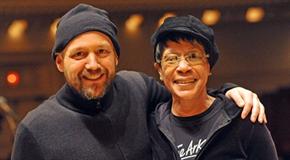
How long have you been doing the tribute shows?
The Carnegie series started in 2004. The first one was Joni Mitchell, the second was Bob Dylan, the third Elton John, then Bruce Springsteen. Then we did The Who, R.E.M., last year was Neil Young and this year was The Stones. I did one other in there that wasn’t part of this series. It was on the Central Park Summerstage for Simon & Garfunkel. It was their annual gala and I was asked to put one [a tribute] together.
This series – eight years at Carnegie – started when I was asked by an organization to make a contribution. I, like today, still can’t write big cash checks, but I want to offer what comes natural – promoting a show.
I gave them the idea that I wanted to bring a bunch of really good singer/songwriters together to pay tribute to a great singer/songwriter and do it in a room that traditionally doesn’t have rock ’n’ roll. I was really thrilled to see in this morning’s New York Times, the piece about Jay-Z at Carnegie Hall. The whole lead of that story was how historic to have a real hip-hop person, rapper, on stage at Carnegie Hall to juxtaposition on some level to what we’re used to. And that’s true Carnegie, for the most part, has presence itself. But when you go into the deep history, The Stones, The Beatles, Dylan… a lot people did a run there, you just don’t get a lot anymore. Most of it is classical.
My modus operandi for a while, the fans with disposable incomes now, they don’t want to stand for a show. They really like to sit. I believe here at New York City Winery they want to sit and drink a glass of really good wine and eat some good food. You can’t do that at Carnegie but at least you can sit and see a good show.
They asked me to do the first one supporting music education for under-served youth. It was a cause that really hit a chord back then and sadly continues to be a very important cause today. With more cuts in public education, what ends up happening is that the arts is always the first program to be cut.
The recipient of this series keeps growing because it keeps finding and connecting with more and more music programs doing great work in reaching kids. It’s never been a better time to give money to this area of society. I feel compassionate about the cause and it keeps driving this great series.
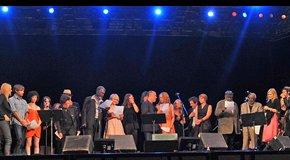
Getting back to that first show. Was it your idea to honor Joni Mitchell, or did someone suggest it?
Joni was all me. One of my absolute favorites, I’ve always been a big, big fan of Joni. Here was an artist that doesn’t play out much. You don’t get a chance to hear her work done live. Even more so than, obviously, someone like Bruce Springsteen or R.E.M. at the time. That was kind of the impetus, if you will, for the first one. I’d really like to hear Shawn Colvin, Martin Sexton, or Suzanne Vega doing a Joni Mitchell song. I like covers. Covers are hard not to like and to hear them interpreted in these voices that I also really appreciate, was just a nice mix. That was the impetus of the first one.
When that show sold out and netted $100,000 for charity, I said, “Wow! We have something here.”
Then the next one was the opportunity to ask, “Who’s one of the greatest songwriters in the world?” And again, following that idea, wouldn’t it be fun to give Bob Dylan [a tribute] and actually understand most of the lyrics, sung by favorite artists.
After going from Joni Mitchell to Bob Dylan, all of a sudden it was wide open with opportunity. I’ve said this before, I really am a kid in a candy store. To be able to go, “What body of work do you want to offer to 20, 21 really talented singer/songwriters to present at Carnegie Hall?” There are so many options and exciting possibilities.
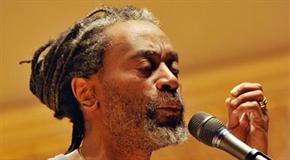
Are there ever any “Eureka” moments where the subject of a tribute show suddenly pops into your head?
I think the answer is yes, it’s happening all the time. Manifesting that into the actual show is a little different. I think on some level the choices so far have all been pretty safe. Everyone we’ve picked, the body of their work, their songs are hits, they’re classics. Whether it’s The Who or The Stones or Neil Young, finding 25 to 30 songs of theirs that people want to hear and artists want to cover, is actually pretty easy.
We had considered Pink Floyd, who I love and the public love and there’s some attention again with Roger Waters touring with The Wall. No question [Pink Floyd] is one of the great bands of our time. But in spending time with management, they challenged me to come up with 20 songs the public would want to hear. Immediately you go to Dark Side Of The Moon and there’s a bunch of great songs. But all of a sudden the collection isn’t that large. The body of work wasn’t as appropriate for this series as one would think.
Then there’s been a bunch of artists that I’ve been begging to give me permission. And one could do this without permission. We could just do “the music of…” But in every single case every year we went to the artist and the manager, explained what we’re doing with the hope that the artist would show up and sit in the audience or even grace the stage at the end of the show. We’re batting 50 percent. We always want permission. We want the performing artist to know that we’re doing this with the ethical and right authority to do it even though by law as long as we pay the performing rights agency, we can do the music of anybody. But that’s not what we’re doing here.
Which artists have appeared for their tributes?
Bruce Springsteen came and played the encore. What was amazing to me was that in two songs he had worked up a full sweat. He stood out because he caught a private plane after the show to catch up with his family in Florida. He made a major effort to be there. He was amazing.
R.E.M. came and played the encore. Bernie Taupin came to the Elton John tribute and enjoyed the show. Simon & Garfunkel came and enjoyed their show.
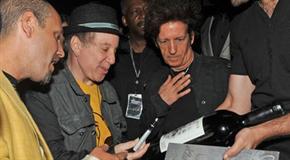
Do you ever run into problems where more than one artist wants to do the same song?
Oh, for sure. That happens every time. We do take a first-come, first served [approach]. The Rolling Stones tribute is a little different than the rest in that we decided to curate the Hot Rocks collection. Every other time we basically said, “Let’s do 20, 21 songs of the artist’s full catalog.” Then it was a first-come, first-served on songs and we would work with the artists on the song selections. Sometimes there were some songs even deep, deep, catalog that I had forgotten about and the artist brought them to the table and we had that in the show. Then in some cases we would make some suggestions to artists that were looking for some ideas. Then there are a couple of seminal songs that needed to be performed.
Each year up until now it’s been a really fun, kind of curatorial back-and-forth process. Then we think about the sequence of the evening so it has an ebb and flow for a show. [We take] great pride in a production that only has a one or two minute segue between songs so the audience thinks it’s a very smooth show.
We’re taking Hot Rocks and we’re doing it in the order of the original record because it’s hard to listen to the songs not in that order. Everybody has played this record so many times. There’s no reason to break tradition. It’s created a little more of a production challenge for us, but that’s exciting. In essence there’s only 21 songs to choose from.
And there was a little bit of politicking. Marianne Faithful had to do “As Tears Go By.” For the most part there was a little bit of cajoling, brokering and engagement and it has worked out fine where we have a very clear schedule and everybody is happy.
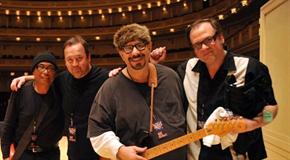
With any tribute show, are there problems juggling all the egos?
We’ve been very lucky. There are 21 artists on this show and there are only nine dressing rooms backstage at Carnegie Hall. Already, we have one of the hardest challenges of, I guess, dealing with your question of ego.
There is a bit of management on our part, of the expectations when the artists get backstage and the fact they are going to be sharing with two or three other groups. Maybe they haven’t met before. We’re almost like a wedding planner. We do have to think through some of the things – who might know who, who are old friends, who are hanging out and talking together. One of the things I bring to the table is, I hope, [is that] we are very good at being good hosts. On some level, I’ve said this for 25 years running a venue. Part of being a venue person versus a pure promoter is that you’re the host. You’re dealing with hospitalities. We pay a lot of attention to food and wine and taking care of the transportation. We want this to be a nice experience for the artist because they’re giving a token, an honorarium. They’re donating their time. In many cases [its] a real effort to work out a new version of a song or something they haven’t done before and kick it up a notch.
Many artists have played much bigger rooms than Carnegie Hall, which is 2,800 seats, and they’ll get nervous about it for two reasons. One, they get nervous about it being Carnegie and a lot of them have never played Carnegie before. Two, if the honoree is sitting backstage or in the audience, they want to do as good a job as possible. And even if the honoree isn’t there, usually somebody is going to get back to them, whether it’s a review in The New York Times or a good friend, in terms of their performance.
So everybody steps it up a notch and there’s a certain excitement backstage and electricity. I think that energy and what we really do focus [on] in terms of the hospitality and artistic management, almost without exception we have no ego issues backstage. We create a little congregation with good food to hang out. Actually the backstage component from soundcheck to the show is a fantastic vibe to see, young interacting with old musicians. You see this incredible scene of really great artists.
I’m sitting there looking at our schedule imagining Art Garfunkel talking to Glen Hansard talking to Steve Earle, sitting around having cappuccino. It’s such an interesting mix of people, great artists, and in essence we’ve created the environment so that egos don’t come into play.

Do most artists stay for the compete show or do they perform one song and then leave?
We’ve had seven shows, and 140 musicians. There’s been less than five that haven’t stayed for the whole show.
Does the word spread among artists about your shows? Do artists ask to be on a tribute?
The clear answer is yes. That happens a lot. We’ll get calls from management. We do a lot of outreach but we also receive inquiries about it once we announce the honoree. Between agents and managers and some of the artists themselves, we get that. What’s been a pleasure for the last three years is having City Winery. There’s no denying the fact that City Winery has become a home for a lot of the talent that has played on these tribute shows. We’ve filled a real interesting void in New York. We’re opening in Chicago and doing the same. I think we’ve found a niche for the aging singer/songwriter and their audience who want to come in and enjoy an intimate concert with luxurious food and beverage service.
We have big concert posters. We’ve made a few oversize posters every year and they decorate our dressing room here at City Winery. You get an artist who hasn’t perhaps been on the show but then they see these lineups and these shows and they go, “Wow! That is so cool. I wish I was on that one.”
We actually get more artists right before a show here talking to us, going, “When is your next tribute? I’d love to get on it.”
Do you see a specific age or a specific demographic at the tribute shows?
It’s a pretty wide demographic for a couple of reasons. “The Music Of The Rolling Stones” appeals to a huge older [audience] but there are also younger fans of The Stones. But when you bring in someone like Gomez or even Wyclef Jean or Peaches to perform The Stones’ music, Peaches [and] Gomez have a way-younger audience. They obviously know The Stones, but might not be a big Stones listener. They’re intrigued with why Gomez would like to do a tribute. Therefore we can pull some of that artist’s fans. When you aggregate 21 different artists and their fans, you can have a pretty wide demographic.

Are there future tributes you’re contemplating right now that you can talk about?
No but I’m happy to put my foot in my mouth. I’ve been wanting to do an Eric Clapton tribute. I’ve been sending him letters for a few years. His body of work would be great. We’ve had some discussions with Sting and The Police about doing something. I’ve been begging David Bowie to give us permission. There’s certainly a list, a to-do backlog of tributes, that could finish up this decade pretty easily. Finding the honoree in the end, the number of artists and bodies of work, will always be there. By the time we get to Radiohead in five or ten years, they’ll probably have five or ten more classics. It’s a great process.
Do you find yourself scoping out younger artists with the idea that someday they could be an honoree?
Sure. There are so many prolific great songwriters. Who knows where their [careers] will be in five or ten years.
Your own career is unique in the music world. You started the Knitting Factory, founded the Digital Club Network, City Winery and these tribute shows. What would you tell a high-school graduate who wants to have a career like yours?
I think the real answer is to have a belief in doing it. You got to like it yourself. If you’re just trying to sell the product, whether it’s the live show, the digital product or the hard CD, and you’re only doing it because … you think you can make money or you find it sexy or whatever, that’s not the reason to be in the music [business].
You need to be willing and able and interested to commit almost whatever resources you have because you love it. You want to help it along the path.
I lived inside the Knitting Factory for two years. I showered in a gym around the corner for $49 a month for the first three years. That’s where I brushed my teeth. I lived and breathed there [Knitting Factory] and continued to commit everything to it. I think you look at record people, promoters, any of those success stories – financial or helping artists achieve a level of recognition – they truly love what they do.
As advice to that high schooler – you have got to be getting into it for the right reasons. There’s no secret formula to making an artist popular. I think David Geffen had the best quote that I love reading. “There’s a magic to it. You do the same thing for different artists, but sometimes one works. But you got to keep doing it even though you’re going to have a lot of losses and unsuccessful tries.”
I’ve certainly had my share of busts and bad experiences and shows and challenges, but I’m still in it because I love it.
